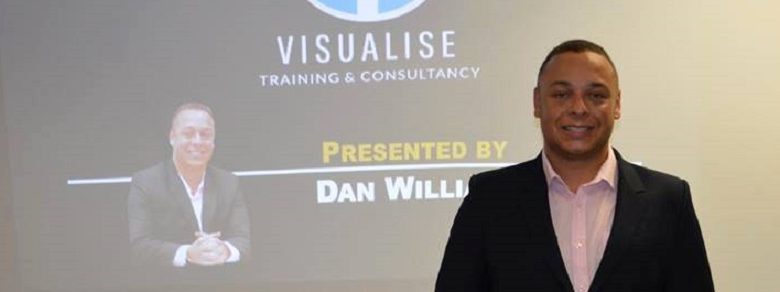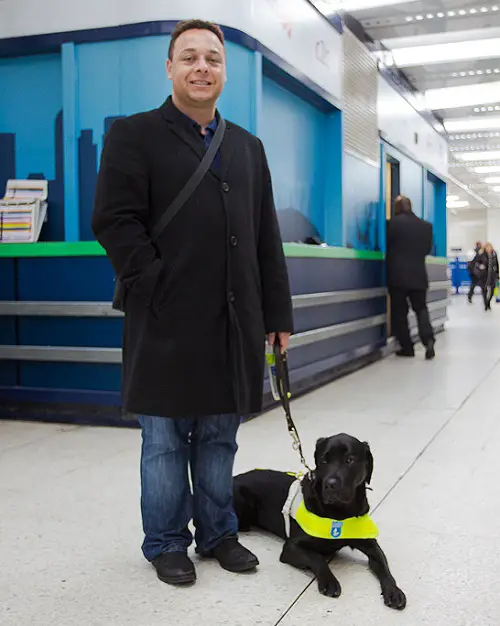
Making a difference for disabled people with my own business
Daniel Williams, an entrepreneur with a visual impairment, started his own company, Visualise Training and Consultancy, to increase awareness of the accessibility challenges faced by employees and customers with disabilities. Here, he tells us about the challenges he faced because of his gradual sight loss, society’s low expectations of disabled people, and how meeting Zodiac, his first guide dog, empowered him further.
I was a very clumsy child; always bumping into objects, dropping things and scrabbling around to pick them up. At the age of 8 I was diagnosed with retinitis pigmentosa, also known as RP. Since then, I have experienced a decline in my vision, resulting in loss of peripheral vision, gradual loss of central vision and poor night vision.
The bumpy road I travelled during my formative years
I really struggled during my time at school. I was troubled with depression and poor mental health, and had to fight a system that lacked empathy. I was told that, because of my disability, I would be permanently unemployed and useless to society.
I truly felt that my life and prospects were bleak. When my dreams of becoming a policeman and driving a car were crushed by my disability, I dropped out of secondary school.
When I finally found a job at the local rugby club as a pot washer and occasional chip fryer, I decided not to disclose my disability for fear of prejudice. I suspect that many pots were left unclean and possibly chips half cooked – clearly, the job was not for me.
My counsellor suggested that I looked at The Royal National College for the Blind in Hereford. Although I was apprehensive, I decided to enrol with the college. Thank goodness I did as it changed my attitude to life.
Two years after that, I enrolled at university to become a rehabilitation officer for people with visual impairments. I completed most of the course, however, there was one component I was unable to finish due to my vision difficulties – I could not teach orientation and mobility skills and guarantee the safety of participants.
Once again, I had to re-evaluate my job prospects.
Founding Visualise Training and Consultancy to help others
Feeling frustrated with the lack of access to services and knowledge about visual impairment, I decided I needed to educate people and businesses, and enable others to make a difference.
So, at the age of 22, I launched Visualise Training and Consultancy. It works with and trains organisation on the needs of people with visual impairments, so it can offer better and more tailored services.
Over the past four years my business has grown. As well as working with businesses, I also conduct work-place needs assessments to help disabled people stay in employment.
I also sit on many advisory panels, including the RNIB (Royal National Institute of Blind People) and a public transport panel, and I am continually seeking opportunities, information and help to best support people with disabilities.
How I met Zodiac – my guide dog companion

Running a business as a visually impaired entrepreneur is demanding, and means that I need to take my own support needs very seriously. I started to notice that negotiating busy town centres was becoming increasingly difficult for me, and walking to and from the gym at night filled me with trepidation.
So, two years ago, I made enquiries about having a guide dog and after completing an initial assessment, was added to the waiting list. I live in Cardiff, but travel nationwide, which means that I need a dog that is versatile, robust and able to travel on all modes of transport. As I use the London Underground regularly, my future canine companion needed to be underground and escalator trained.
After a very long wait, I was finally matched with Zodiac – a male, black Labrador. Initially, I was excited, but also apprehensive – having a dog is a big responsibility, let alone a working dog. I have never owned a pet dog and was concerned how I would feel about having a constant companion, and how the dog would feel about being with me.
For an initial assessment to see whether Zodiac and I were compatible, I travelled to the London Office of Guide Dogs for the Blind. We walked with the Guide Dog Mobility Instructor on a route that included shopping areas, busy roads, zebra crossings and, not to forget, the obligatory coffee shop. The day went well and I knew he would be the dog for me.
After the initial successful day together, a two-week residential course was arranged for Zodiac and me. The training was intensive, frustrating, tiring and emotional. There were so many commands and hand movements to learn. But, most of all, it was inspiring and empowering.
From being invisibly disabled to visibly disabled
Zodiac changed my life in different and unanticipated ways. The changes have, for the large part, been transformative. I’ve found a new level of freedom, knowing I can put my trust in Zodiac.
But it’s not all been positive. My disability used to be invisible. But now, with Zodiac in tow, it has become visible. You cannot ignore a 33kg black Labrador wearing a high visibility harness. I can no longer get away with being invisibly impaired!
It also quickly became apparent to me that people speak to me in a different tone of voice. I had to accept a newfound ‘label’. People glance over their shoulder, staring, taking one look at the dog and a second look at me. It has made me feel as if I am constantly on display. Hopefully, this will improve with time.
A few months have passed and Zodiac and I are now a well-oiled team. I no longer have to instruct him to go to the gym – he knows exactly what is required of him. He has commuted with me to lots of places using various forms of transport. But our journey has only just started. We have many obstacles yet to overcome. But the future looks a lot brighter to me with Zodiac.
You can learn more about Daniel’s experience of getting a guide dog, including exactly what training is involved, by watching his video of the experience.
By Daniel Williams
Get in touch by messaging us on Facebook, tweeting us @DHorizons, emailing us at editor@disabilityhorizons.com or leaving your comments below.
Check out…
- Learning disabilities represented on New Year’s Honours List
- Home, Design and Build Summit: a step forward for accessibility
- Direct Payments: the disparities between local authorities
Originally posted on 02/03/2018 @ 12:01 am
One Comment